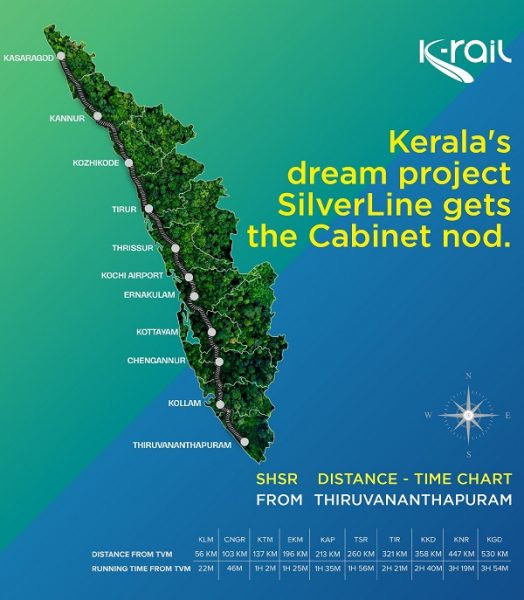
No brakes on Kerala SilverLine Project; DPR says Rs 6-crore daily revenue
One of the major criticisms against Kerala’s ambitious SilverLine Semi-High-speed Rail project has been that it will be difficult to link the rail built on standard gauge to the existing broad gauge line of the Indian Railways. However, the state government seems to have gone ahead and fixed the globally proven standard gauge (1,435 mm) for the high-speed rail project after discussions with the Railway Board, according to the SilverLine's Detailed Project Report (DPR).

One of the major criticisms against Kerala’s ambitious SilverLine Semi-High-speed Rail project has been that it will be difficult to link the rail built on standard gauge to the existing broad gauge line of the Indian Railways. However, the state government seems to have gone ahead and fixed the globally proven standard gauge (1,435 mm) for the high-speed rail project after discussions with the Railway Board, according to the SilverLine’s Detailed Project Report (DPR).
The state government had always maintained that it is impossible to run trains with a speed of 200 km per hour through the Indian Railways broad gauge rail line of 1,678 mm.
According to a report in Malayalam Manorama, the DPR submitted to the Centre by the state government, said that the standard gauge for the SilverLine rail project, to be implemented by the Kerala Rail Development Corporation, has been fixed as per international standards. The SilverLine Semi-High-Speed project is aimed at setting up 529.45 km of rail corridor connecting Thiruvananthapuram to Kasaragod, reducing the travel time to just four hours. The current travel time on the existing network is 12 hours.
This railway line will run roughly parallel to the Western Ghats along Kerala’s coast and pass through 11 districts.
Meanwhile, the DPR further revealed that the state government expected 54,000 passengers to travel daily on this SilverLine rail once it gets functional in 2025. According to the state government, 12 to 38 per cent of the 79,934 persons who use road and rail services daily in Kerala, will turn to this rail as a means of transport in the future.
Also read: Kerala’s SilverLine rail project an idiotic decision: E. Sreedharan
Moreover, the rail will run 37 services on a daily basis in the first stage of commissioning. During peak hours there will be a train service every 20 minutes. And, each train will have a passenger capacity of 675.
The state government expects an annual revenue of ₹2,276 crore and daily revenue of ₹6.2 crore. The yearly revenue is expected to double to ₹4,504 crores and this amount will scale up to ₹10,361 crores in 2042 and ₹21,827 crores in 2052.
The rail will cover a distance of 530.6 km and 293 km of which will be built on elevated land and both sides of the rail will be fenced. Interestingly, Metroman E Sreedharan (and a former BJP candidate in the Kerala assembly elections) who had criticised the project on many fronts saying it was ‘ill-conceived,’ ‘lacked technical perfection’ and is being ‘badly executed,’ had said that he was not against the proposal of a high speed rail, per se, but the project needed lots of corrections including its basic track width.
“It should be a broad gauge instead of the proposed standard gauge,” he had said, according to media reports. But Sreedharan had also raised the issue about how high walls have to be constructed on either side of the tracks, as it passes through paddy fields, to prevent trespassing, blocking free passage and drainage.
Media reports quoted him as saying that this wall will be equivalent to the China wall and will divide Kerala from north to south. “This is an idiotic decision. SilverLine should be away from the existing line, either elevated or underground. Nowhere in the world high-speed or semi high-speed lines are planned at the ground level,” he had said.
The cost of the SilverLine rail project
Meanwhile, the DPR also laid out the rail project cost, which has been pegged at ₹63,940.67 crores and every year, the project cost is expected to go up by five per cent (₹3,200 crores).
Also read: Ambitious railway project threatens Kerala’s fragile ecology
Further, the DPR showed that the state government planned to launch freight services through the rail by using 480 train trucks and run tourist sleeper services along with a private player to generate additional income as well. The annual revenue from freight services is expected to be ₹237 crore at first. The government will also ensure that the SilverLine rail project stations are suitably linked to bus stations, airports and jetties.
The state government has also classified the 11 rail stations coming under the project into three categories based on the number of passengers using the service and the revenue earned, said the report. For example, A Class will be Thiruvananthapuram, Kollam, Ernakulam, Thrissur, Kozhikode, Kannur and Kasargod, while the B Class, will include Chengannur, Tirur and Kottayam and Cochin airport will fall under Class C.
On Saturday (December 18), the Congress-led United Democratic Front held state-wide protests against the SilverLine rail corridor project alleging it was “unscientific” and “impractical”.
Several environmentalists, organisations and peoples’ bodies have come out to protest the project’s expected environmental impact. An analysis of the SilverLine project by the Kerala Sastra Sahitya Parishad, entitled ‘Silverline and Kerala’s transport’, said that based on all the existing information regarding the project they have arrived at the conclusion that it is not the “right priority” for the state.
Other experts have called for a more comprehensive environment impact assessment.

